Ayatul Kursi In English, Arabic Text, Transliteration And Benefits
Advertisements
Ayatul Kursi is known as the Throne Verse, and there are a number of hadiths which prove that it is the most excellent verse in the Qur’an. Here is the full meaning and benefits of Ayatul Kursi In English.
Ayatul Kursi in Arabic Text
The written form of ayatul kursi in Arabic text is:
اللَّهُ لاَ إِلَهَ إِلاَّ هُوَ الْحَيُّ الْقَيُّومُ لاَ تَأْخُذُهُ سِنَةٌ وَلاَ نَوْمٌ لَهُ مَا فِي السَّمَاوَاتِ وَمَا فِي الأَرْضِ مَنْ ذَا الَّذِي يَشْفَعُ عِنْدَهُ إِلاَّ بِإِذْنِهِ يَعْلَمُ مَا بَيْنَ أَيْدِيهِمْ وَمَا خَلْفَهُمْ وَلاَ يُحِيطُونَ بِشَيْءٍ مِنْ عِلْمِهِ إِلاَّ بِمَا شَاءَ وَسِعَ كُرْسِيُّهُ السَّمَاواتِ وَالأَرْضَ وَلاَ يَئُودُهُ حِفْظُهُمَا وَهُوَ الْعَلِيُّ الْعَظِيمُ.
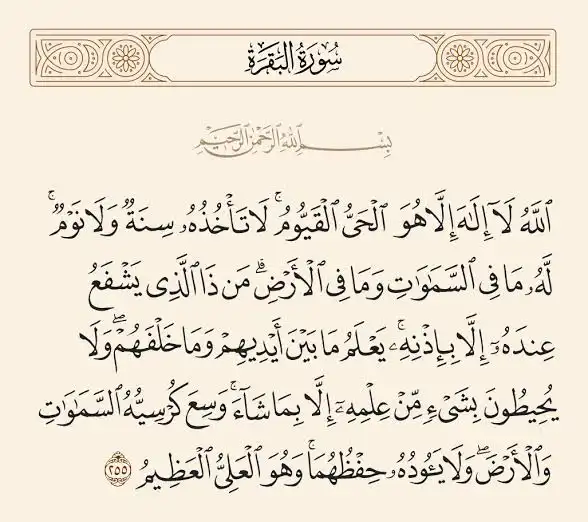
Ayatul Kursi Transliteration
The full transliteration of ayatul kursiyyu is Allahu laaa ilaaha illaa huwal haiyul qai-yoom, laa taakhuzuhoo sinatunw wa laa nawm; lahoo maa fissamaawaati wa maa fil ard, man zallazee yashfa’u indahooo illaa be iznih, ya’lamu maa baina aideehim wa maa khalfahum, wa laa yuheetoona beshai ‘immin ‘ilmihee illa be maa shaaaa, wasi’a kursiyyuhus samaa waati wal arda wa la ya’ooduho hifzuhumaa wa huwal aliyyul ‘azeem.
Ayatul Kursi In English
The full meaning of Ayatul Kursi in English is Allah: there is no god but He, the Ever-Living, the Self- Sustaining and All-Sustaining. Neither slumber nor sleep overtake Him. To Him belongs all that is in the heavens and on earth. Who is there that can intercede with Him except by His leave? He knows what was before them and what will be after them, while they encompass nothing of His knowledge except what He wills. His Kursi extends over the heavens and the earth, and the preservation of both does not weary Him, for He is the Most High, the Most Great.
Advertisements
Ayatul Kursi Full Explanation
This verse is the greatest, best and most sublime verse in the Qur’an, because of what it points to of important matters and divine attributes.
Hence there are many hadiths that recommend reciting it regularly at different times, morning and evening, when going to sleep and following the prescribed prayers.
In it, Allah tells us about Himself that there is no god but He that is, there is none deserving of worship except Him, for He is the true God to Whom all types of worship, obedience and devotion should be directed, because of His perfection, the perfection of His attributes and His great blessings.
And it is befitting that the human being should be a slave to his Lord, following His commands and heeding His prohibitions.
Everything other than Allah SWT is false and worship of anything other than Him is false, because everything other than Allah is created, imperfect, under His control and dependent (on Him) in all ways, so it does not deserve to be worshipped in any way.
Advertisements
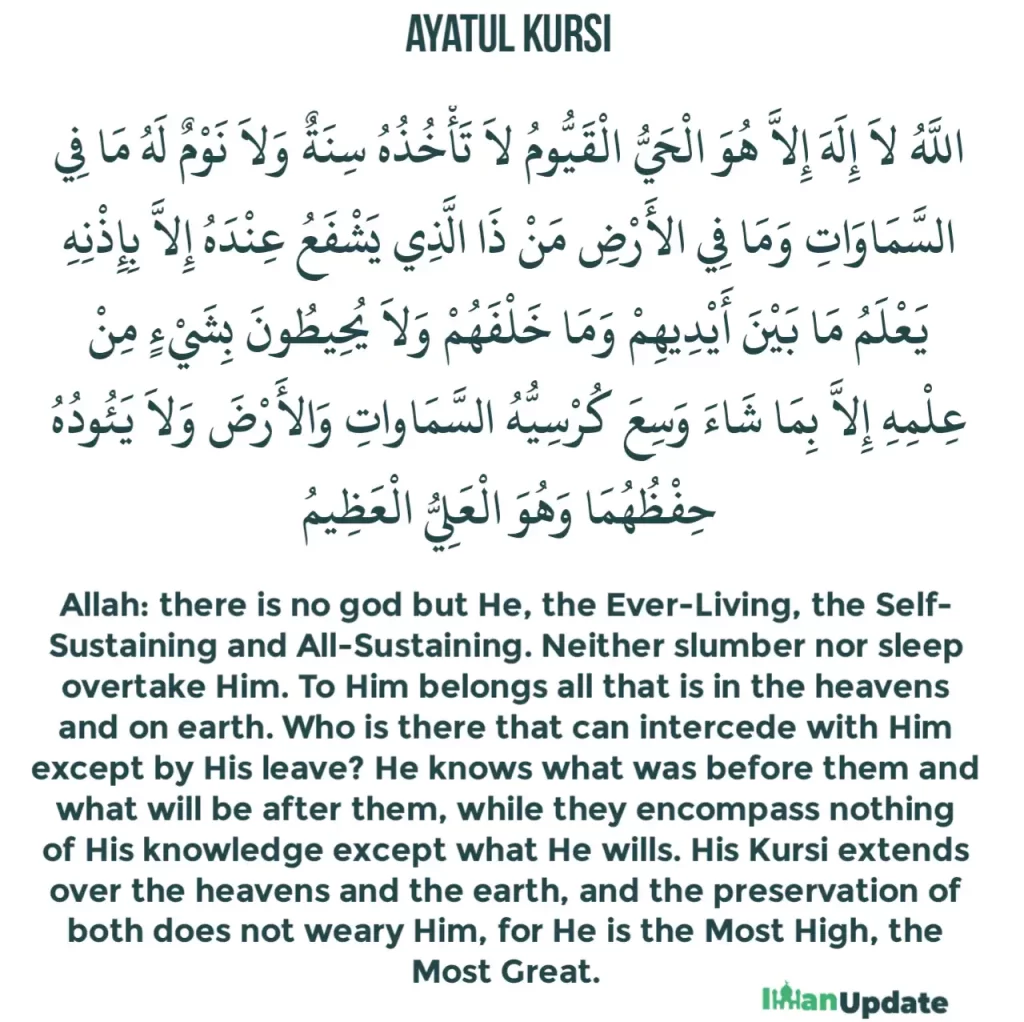
“Allah! La ilaha illa Huwa (none has the right to be worshipped but He), the Ever Living, the One Who sustains and protects all that exists.”
This contains the sanctification of the Oneness of Allah, Honored and Glorious is He.
‘La ilaaha illa Huwa Al-Hayyu Al-Qayyum means there is no god worthy of worship in truth except Him, Glorious and Honored.
Everything worshipped besides Allah is a case of misplaced worship even if it is named a deity. This is just a name, which they have forged for which Allah has sent down no authority.
“The Ever Living, the One Who sustains and protects all that exists.” That is, the One Who is perfect in His living and His Timeless Existence.
He is the perfect Living One Whose existence was not preceded by a period of nonexistence nor will it be followed by extinction.
Al-Qayyum has two meanings:
- 1. The Self-Subsisting Who exits by Himself and is not in need of anyone; and
- 2. The One Who sustains every other thing; that is, every other thing is in need of Allah.
The Ever-Living, the Self-Sustaining and All-Sustaining these two divine names inherently imply all the other divine names.
The Ever-Living (al-Hayy) is the One Who has perfect life, which implies all attributes of His essence, such as hearing, sight, knowledge, power, and so on.
The Self-Sustaining and All-Sustaining (al-Qayyoom) is the One Who is self-sustaining and Whom others need to exist.
This implies all the actions of the Lord of the worlds, Who does whatever He wills of rising above, descending, speaking, creating, granting provision, giving life and death, and all types of control.
All of that is included in the concept that He is Self-Sustaining and the Sustainer of others.
Hence some of the scholars said that these two are the greatest names to which, if Allah is called upon by them, He will respond, and if He is asked by them, He will give.
The perfect nature of His being Ever-Living, Self-Sustaining and All-Sustaining means that Neither slumber nor sleep overtake Him. The word translated here as slumber implies drowsiness.
“Neither slumber nor sleep overtake Him.” Slumber is a dormant state which precedes sleep. Sleep is well known.
Allah, Honored and Glorious, is not overtaken by slumber nor sleep but man is overtaken by slumber and sleep even while observing Salat.
Man sometimes slumbers while talking to people as he is unable to control himself.
But Allah, Honored and Glorious is He, is never overtaken by slumber nor sleep because of His perfect Existence, the Mighty and Sublime, and His Perfect Self-subsisting nature.
In an authentic hadeeth, the Prophet SAW said: ‘Verily, Allah does not sleep and it is not proper for Him to sleep.’
This means that it is totally impossible for Him, Honored and Glorious is He, to sleep, because He has perfect Existence and is perfectly Self- Subsisting.
Who would maintain creation if the Creator slept! There is no one, so He, Glorious and Honored is He, is not overtaken by slumber nor sleep.
To Him belongs all that is in the heavens and on earth that is, He is the Sovereign, and everything other than Him belongs to Him.
He is the Creator, the Provider, the Controller, and everything other than Him is created, provided for and controlled; it does not possess for itself or for anyone else the weight of an atom in the heavens or on earth.
Hence Allah says: Who is there that can intercede with Him except by His leave? That is, no one can intercede with Him without His permission.
All intercession belongs to Allah, but when He wants to show mercy to whomever He will among His slaves, He gives permission to whomever He wants to honour among His slaves to intercede for him.
The intercessor does not initiate intercession before permission is given. He knows what was before them that is, what is past of all things and what will be after them that is, what lies ahead in the future.
His knowledge encompasses all details, past and future, apparent and hidden, seen and unseen.
People have no control over their affairs at all, and they do not have the slightest knowledge except that which He has taught them.
Hence He says: while they encompass nothing of His knowledge except what He wills.
His Kursi extends over the heavens and the earth. This is indicative of His perfect might and all-encompassing power, as the Kursi encompasses the heavens and the earth, despite their vastness and the greatness of what they contain.
The Kursi, however, is not the greatest of Allah’s creation; rather there is something that is greater than it, namely the Throne al- ‘Arsh and that which no one knows except Him.
The greatness of these creations dazzles the mind and is beyond comprehension; it causes the mountains to crumble and cannot be grasped by even the most brilliant of human minds.
So how about the greatness of their Creator and Initiator, Who instilled in them many wonders and mysteries that point to His great wisdom, the One Who keeps a firm hold on the heavens and the earth, lest they fall apart, without becoming tired or weary?
Hence He says and the preservation of both does not weary Him that is, it is not burdensome for Him.
For He is the Most High in and of Himself, above His Throne; He is the Most High in the sense that He is the Subduer of all His creation, the Most High in status, because of the perfection of His attributes, the Most Great);
The might of tyrants appears insignificant when compared with His greatness, and the status of powerful kings appears small when compared with His Majesty.
Glory be to the One Who is possessed of great power and might over all things.
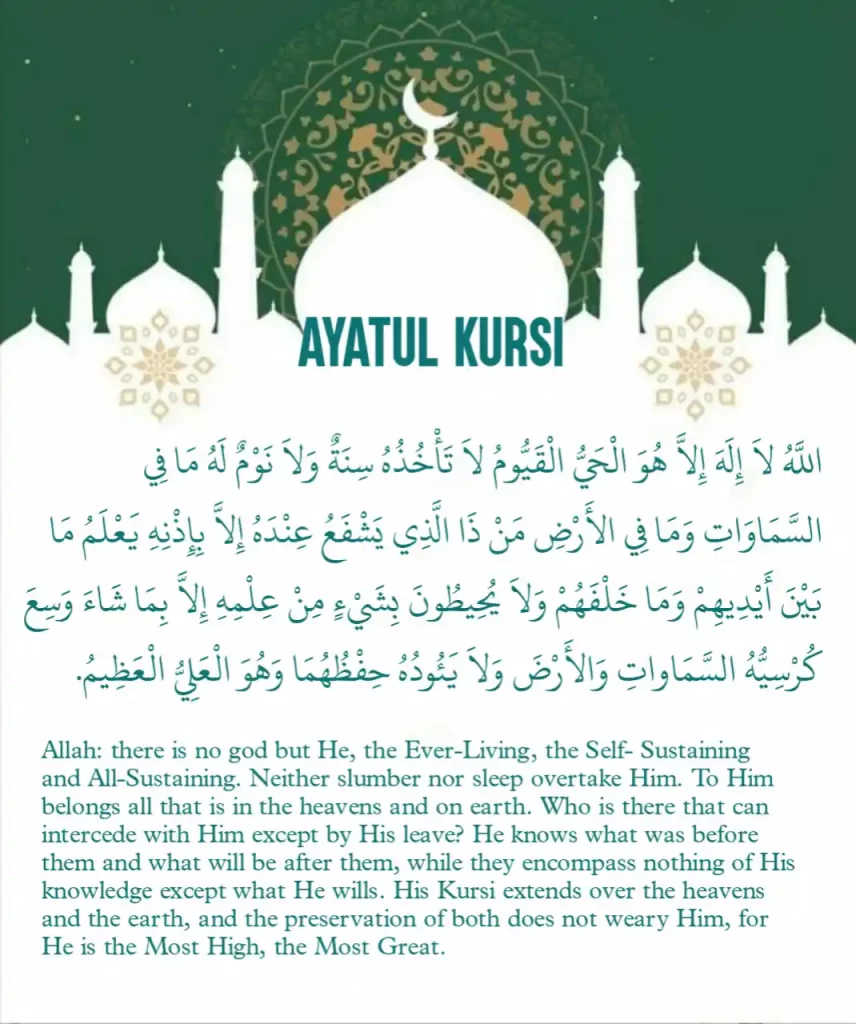
Ayatul Kursi Audio
The below video and mp3 audio the is full Ayatul Kursi recitation, you can listen to it as many times as possible to correct your Pronounciation if it happens you can’t pronounce it correctly.
Why is Ayat al Kursi So Powerful?
Ayat Al Kursi is so powerful because the verse refers to the oneness of divinity (tawheed al-uloohiyah), the oneness of the divine Lordship (tawheed ar-ruboobiyah) and the oneness of the divine names and attributes (tawheed al-asma’ was-sifat).
It also refers to His all-encompassing sovereignty and knowledge, and to the greatness of His power, majesty, glory, might and pride, and His exaltedness above all His creation.
This verse on its own highlights belief in the names and attributes of Allah, and implies all the beautiful names and sublime attributes of Allah.
What is Kursi in English?
The Kursi is the footstool of the Most Merciful, according to the most correct scholarly opinion. It is something other than the ‘ Arsh (Throne), which is the greatest of all things that Allah has created, over which our Lord rose in a manner that befits His Majesty.
‘It is the foothold for the two feet of Allah, Honored and Glorious, and is smaller than the Throne.’
The Throne is bigger than it. In a hadeeth from the Prophet SAW, he said: ‘The similitude of the seven heavens to the Kursi is like a ring thrown onto a field.
The vastness of the Arsh compared to the Kursi is like the vastness of the field compared to the ring.’ When you throw a ring onto a field, which is a piece of expansive land, it will be insignificant.
This is the similitude of the seven heavens and the seven earths to the Kursi; as a ring thrown onto a field.
And the vastness of the throne in comparison to the Kursi is like a ring on a field. The Throne is much mightier than the Kursi, and its Creator, Glorious and High is He, is much greater than it.
If this is the case; that is, the Kursi encompasses the heavens and the earth, and the Arsh is greater, and the Lord is greater than everything and He is the greatest of all things.
Is Ayatul Kursi a Surah or Dua?
Ayatul Kursi is neither a surah nor Dua. It is a verse or Ayat from one of the surah of the Quran. The surah which contains Ayat Kursi is surah Baqarah, the longest surah in the Quran. And the Ayats number is 255, thus the code of Aayatul kursi is 2;255.
What is Ayat al Kursi Used For?
Ayat al Kursi is used for protection. It is the strongest protection against the evil of the jinn. Hence it is Sunnah to read it in the morning and evening, before sleeping, and after the fardh prayers.
Ayatul Kursi Benefits
There are many benefits of reciting the great and powerful verses, among them are:
- If you read it in the morning, you will be protected from shaitan till the evening.
- If you read it in the evening, you will be protected from them till the morning.
- If you read ayatul Kursi before going to bed, a guardian angel will stay by you and no devil will approach you, until you wake up in the morning.
Advertisements

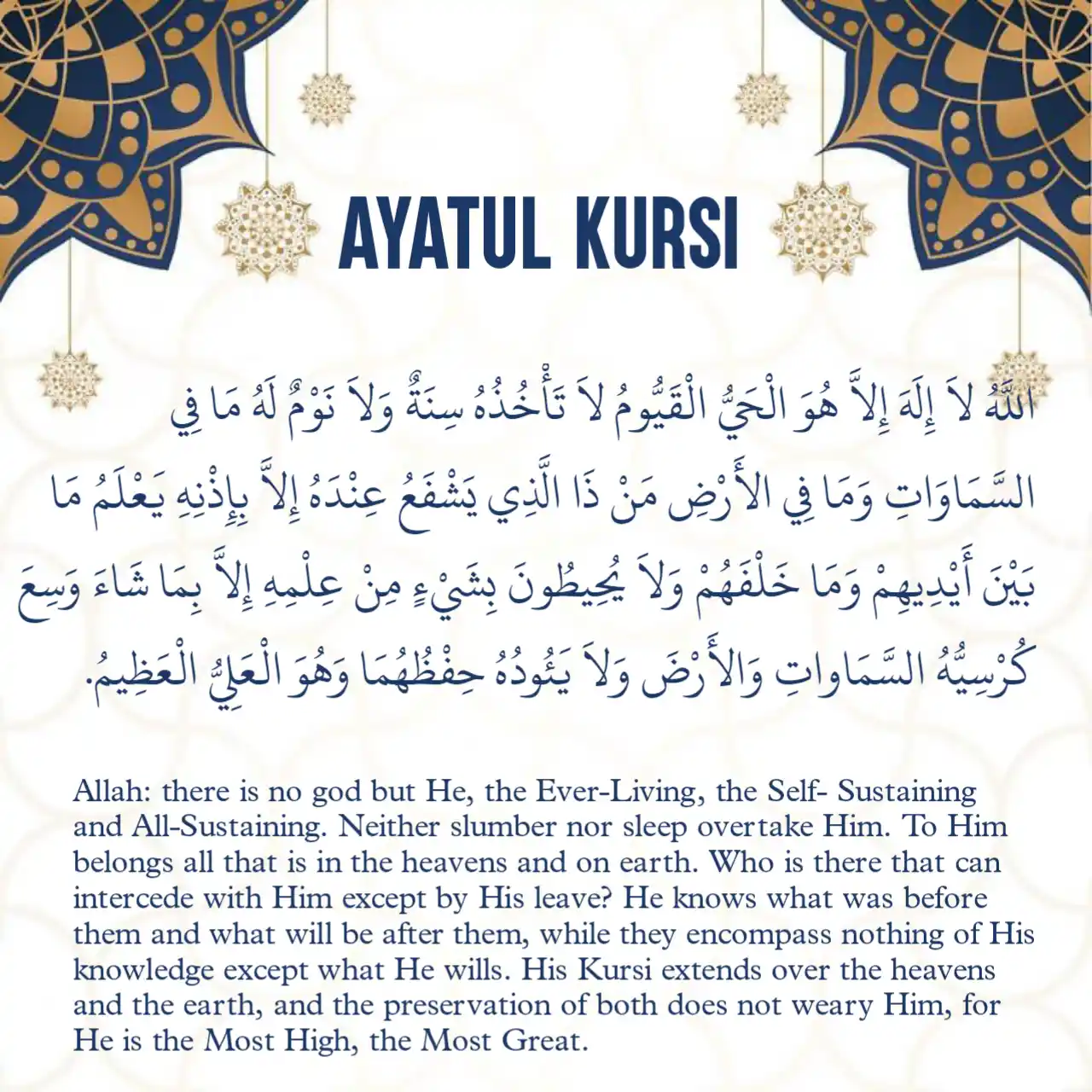
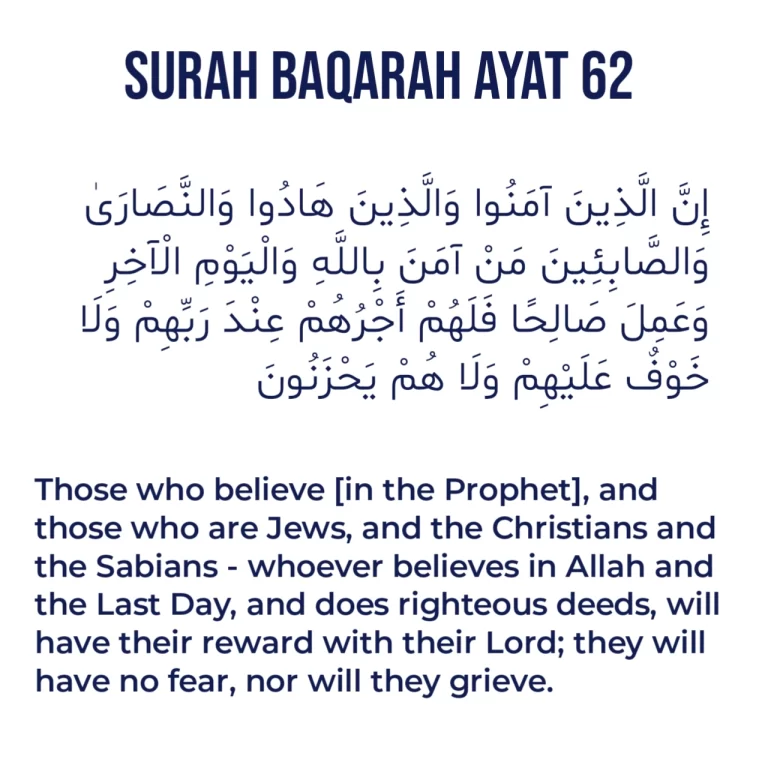
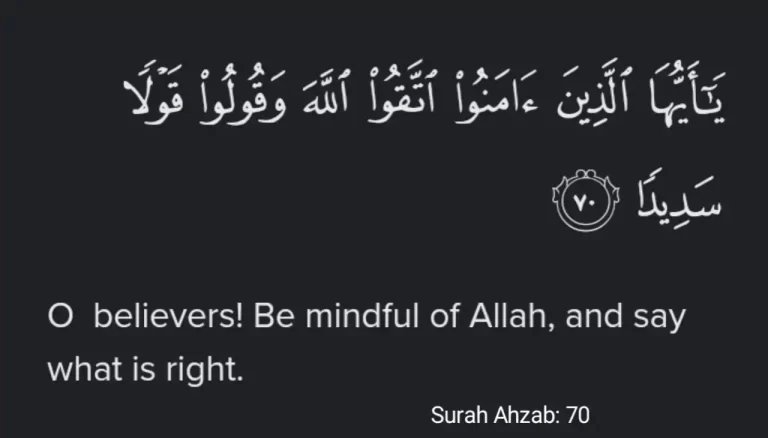
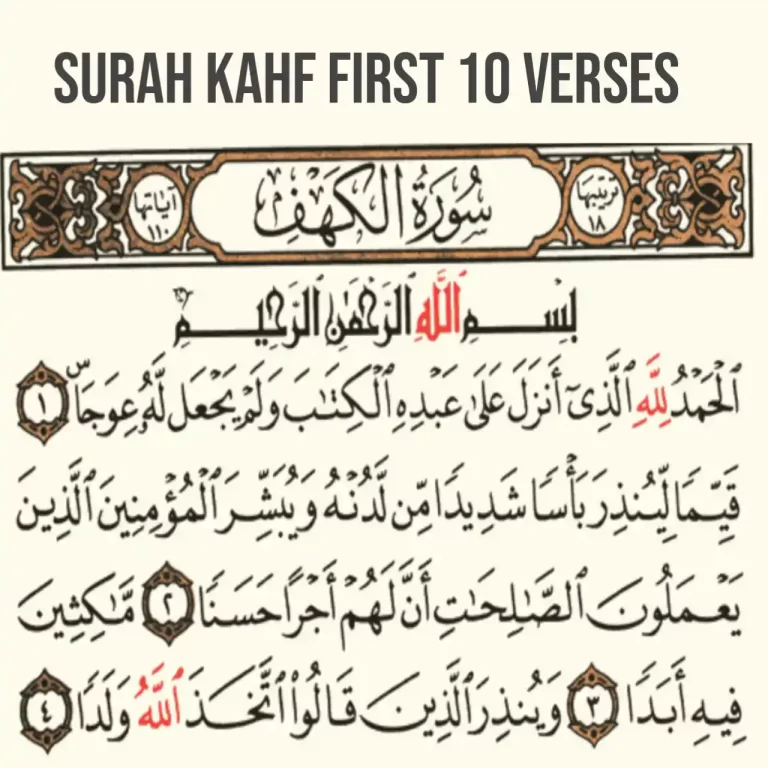
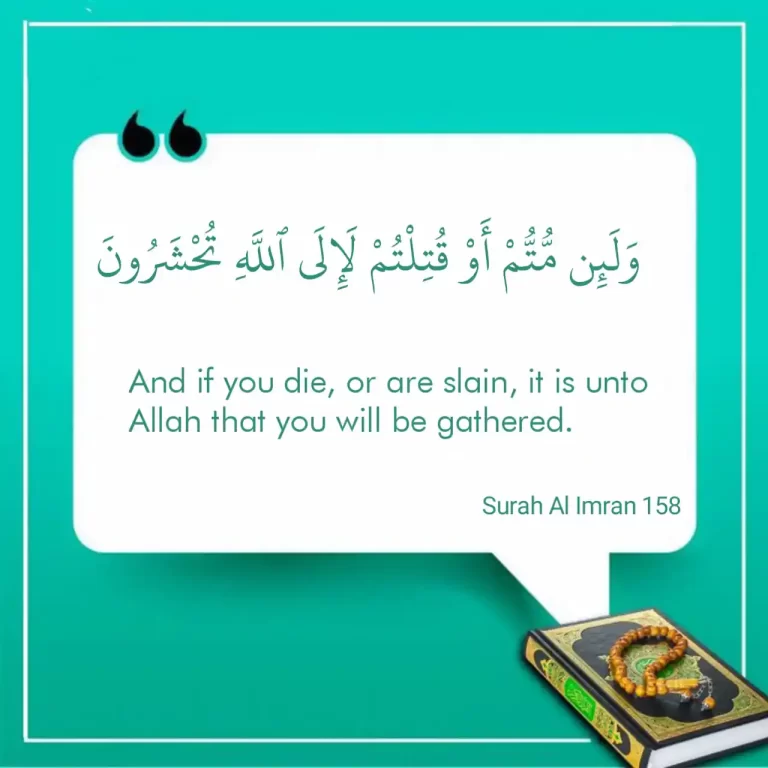
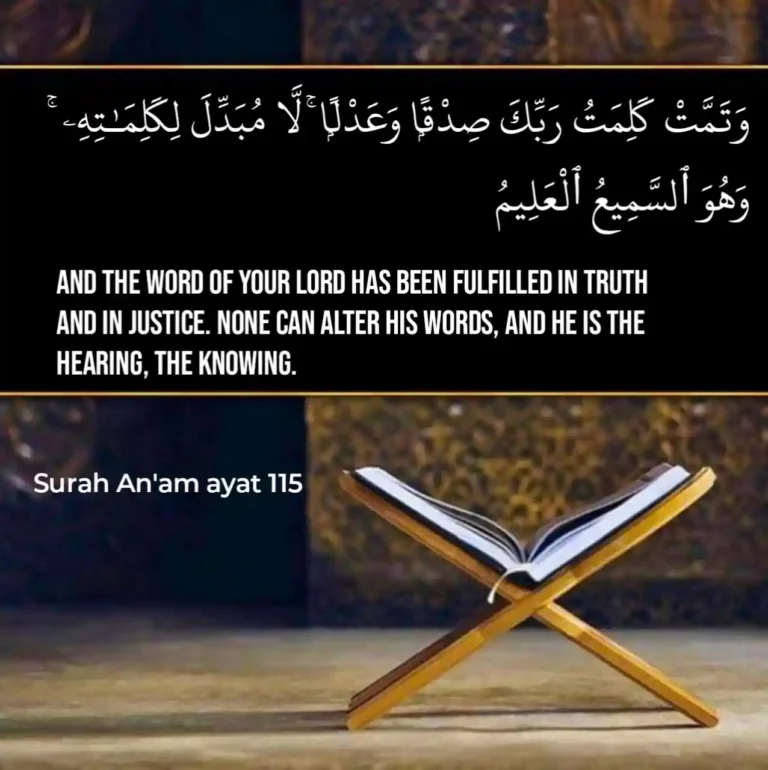
I really enjoyed reading your blog post on the ayatul kursi. I’m not sure if I’m understanding it correctly, but it seems like the ayatul kursi has some sort of spiritual or religious significance?